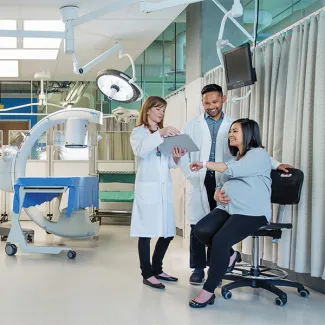Why become a clinical nurse educator?

Clinical education: Take your nursing career to new levels
Nursing is a profession that offers numerous pathways, and clinical nurse educators – with their wide-ranging knowledge of education, practice and leadership and the credential of a master’s degree in nursing – are in high demand. Technological advances in health care, the growing rise of informatics and virtual health, significant staffing challenges and growing pressures on the system are all contributing to the need for nurse leaders.
“In any period of disruption or rapid change, there is a domino effect throughout all levels of the system,” says Dr. Cheryl Segaric, former Director of the Master of Health Leadership (MHLP) in Clinical Education.
“And that presents a pressing need for leadership – for professionals who can advocate and guide for policy changes, lead in education and practice, and create positive workplace cultures where people are able to adapt to and thrive in new ways of working.”
Clinical nurse educators are the leaders the health-care system needs. They are able to bring together diverse perspectives, share knowledge and establish positive work cultures. This is the foundation of both patient-centred care and a thriving and resilient work place.
Learn how to be a clinical educator
The MHLP in Clinical Education offers an interdisciplinary curriculum that equips students with the skills to move into leadership positions. Students take nursing courses in the theoretical foundations of clinical education, curriculum development, research and evidence-based practice, leadership in nursing and health, and the politics of health policy.
Together, these courses enable students to analyze professional practice standards and regulator policies, develop educational strategies to address practitioner’s knowledge gaps, design learning experiences, use technologies and simulation as learning strategies, and consider clinical education within the context of broader organizational goals and mandates.
As Dr. Segaric explains, “Much of the project work involves simulated learning approaches where students work in teams to gain those skills in interprofessional collaboration and teamwork. Assignments enable students to take a practical, pragmatic approach to the types of challenges they will actually be experiencing.”
Courses are taught by renowned experts in their field from the School of Nursing in UBC’s Faculty of Applied Science.
Preparing students to be nurse leaders
Being a health care leader requires much more than knowledge of best practices in clinical education. Leaders need an understanding of fundamental business knowledge that includes project management and organizational leadership. Approximately 30 per cent of the MHLP in Clinical Education curriculum focuses on these and other topics through courses taught by faculty from UBC Sauder’s Robert H. Lee Graduate School, one of the world’s top-ranked graduate business schools.
An intense three-week course in the summer delves into six core business competencies, including accounting, organizational behaviour, finance, marketing, business technology management and professional development. “The knowledge our students obtain in the business courses taught through Sauder also play an important role in their leadership development,” says Dr. Segaric.
“Learning about strategic planning, for example, enables students to get to the root of issues and then map out and develop workable strategies to implement innovative solutions.
Applying clinical educator knowledge in a practicum
Students complete a practicum in their final semester that brings together everything they have learned in their health-care and business courses. Students work within organizations, contributing to organizational goals and enabling them to grow their network.
Yasmin Mohammadkhani, for example, worked as a Clinical Lead Assistant for a team responsible for reviewing the designs of the new St. Paul’s Hospital through the lens of accessibility, taking on a role helping with team formation and management, researching the best evidence-based practice, and operationalizing the definition of accessibility within the context of a health-care setting.
Kristen Law worked with the Office of Virtual Health during the early days of the COVID-19 pandemic to develop guidelines for virtual health visits. She says she pulled from both health-care and business knowledge to do the work.
“In addition to creating a guidelines document that was clinically relevant and applicable, we needed to consider the marketing aspect – what are the best ways to roll this out and how can we get buy-in from people to ensure the document is both useful and supportive for clinical practice? My courses on business and marketing helped me appreciate the importance of stakeholder engagement to create content that directly informs clinicians, which ultimately allows for greater marketability once the document is finalized.”
Advancing into leadership positions as a clinical nurse educator
Graduates of the MHLP in Clinical Education are in high demand in public, private and not-for-profit settings. Some students, like Yenlinh Chung, used the degree to transition from working as a public health nurse to being a nursing practice initiative lead where she uses her skills in evidence-based practice to manage large-scale projects.
Nikko Asistio moved from a position as a clinical redevelopment lead to being the clinical operations manager for urgent and primary care centres in Surrey where he managed a staff of 50 physicians, nurse practitioners and other health-care professionals. “My experience had been primarily patient-facing until that point,” he says.
“I realized that as a manager I needed new tools and knowledge so that I could effectively run a unit or a centre – everything from how to develop workflows to best practices in project management. As a leader, you’re always an educator. Effective change management, for example, depends on educating your team about why change is happening and applying proven strategies to achieve goals.”
Start your future as a nursing leader
The MHLP in Clinical Education was designed for professionals who want to make a difference by deepening both their health care and their business knowledge.
“In health care, leaders have to learn to step beyond their typical job description and work across boundaries,” says Justin Bull, Academic Director of the MHLP in our article What is leadership and management in health care.
“While never forgetting the priority of a patient, leaders learn how to influence organizational constraints, build teams and scale best practices. Leadership means extending your view from the bedside to the broader operating reality, and learning how to effectively influence outcomes to support people, society and our planet.”
If you’re interested in making a far-reaching impact on the health care system, the MHLP in Clinical Education could be a path to consider.






